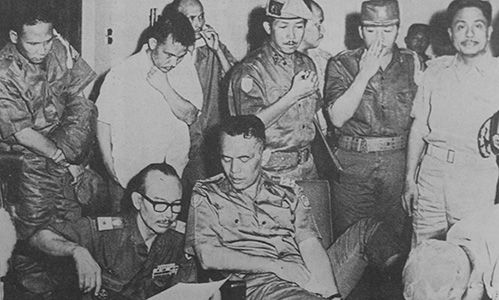Martha Stroud of Center for Advanced Genocide Research to Present Research on Indonesia at Kean University

 Indonesian General Nasution after the coup attempt on September 30, 1965
Indonesian General Nasution after the coup attempt on September 30, 1965The invite-only workshop will be held during Kean University’s summer institute Large-Scale Violence and Its Aftermaths, June 25-29, 2017.
The workshop is a follow-up for scholars who presented papers at the November 2015 symposium “Reflections in the Aftermath of War and Genocide: Empathy, Coexistence, Imagination, Resilience” at Rutgers University. Those scholars are reuniting at Kean University to discuss their book manuscripts that are based on the papers they presented at Rutgers. Participating scholars will present chapters on Rwanda, Colombia, Somaliland, Latin America, Cambodia, Sierra Leone, Nigeria, and the United States.
Stroud received her PhD in medical anthropology from UC Berkeley, for which she completed over two years of fieldwork in Java to explore the ways in which the mass killings and detentions of 1965-1966 continue to emerge in daily life in Indonesia today, 50 years after the killings first began.
Stroud’s book chapter is titled “Rethinking Resilience: Considerations on Resilience in Indonesia After 1965.”
In this chapter, Stroud focuses on the notion of resilience as it emerged in her fieldwork with Indonesian friends and informants as she investigated the relationship between the past and the present when it comes to the Indonesian mass killings that took place in 1965-1966 and their aftermath. Did her friends and informants identify the resilience in themselves that she often tended to ascribe to them? How did they define resilience? What did they identify as the sources of their resilience? In what additional ways can we interpret or define what might at first look only like resilience?
We often do not hesitate to ascribe resilience to survivors who have suffered, endured, and overcome. What about those for whom survival entails ignoring, denying, diminishing, or distorting this catastrophic chapter of Indonesian history? Do their survival and adaptations fit into the category of resilience? Can willful forgetting count as resilience? Are perpetrators resilient too? Using ethnographic examples in her brief inquiry into these questions, Stroud hopes to investigate and complicate the notion of resilience.
Like this article? Get our e-newsletter.
Be the first to learn about new articles and personal stories like the one you've just read.